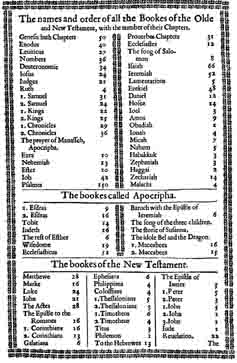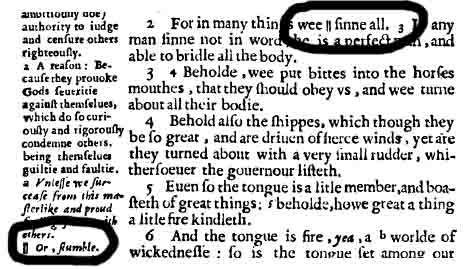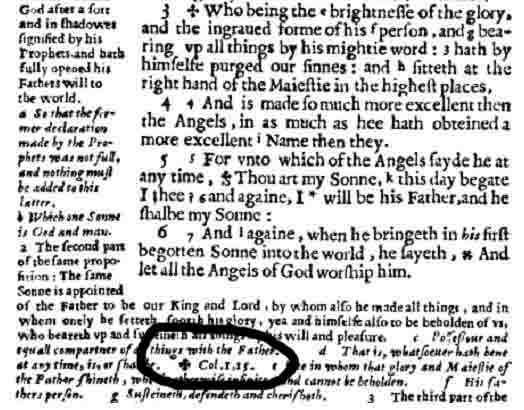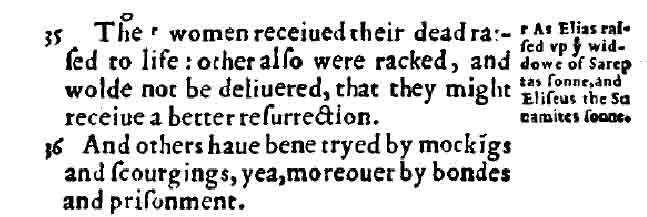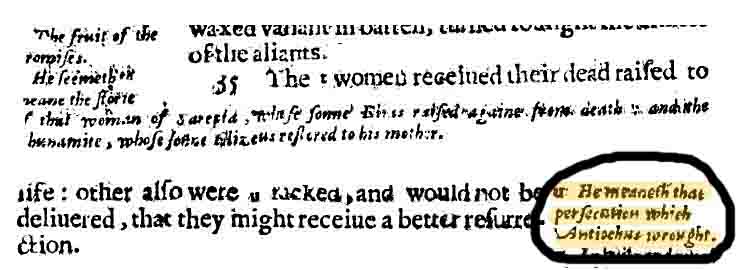The Pilgrims' Regress
The Geneva Bible And The "Apocrypha"
By Gary Michuta
Every American schoolchild knows that the pilgrims landed on Plymouth rock, but do they know which Bible the pilgrims used? Most people, if asked the question, would say the Puritans used the good old King James Version. Wrong. The King James Bible was the "Authorized Version" of the Established Church of England and the Puritans were religious dissenters from that church. The Puritan's Bible of choice was the Geneva Bible, which was translated by Protestants who fled to Geneva from England during the reign of Queen Mary.
|
The Geneva Bible broke new ground for printed Bibles. It was the first Bible to assign chapter and verses to the text and its copious marginal notes qualify it to be called the first study Bible. The marginal notes were from a Reformed perspective and the Geneva Bible (1599) is still revered by many Reformed Protestants today. Like nearly all early Protestant Bibles, the Geneva Bible contained the Deuterocanon gathered together into an appendix between the Old and New Testaments titled "Apocrypha" (Right - the 1599 Geneva Bible's table of contents). By "Apocrypha," the early Reformers meant those books that are good and beneficial for Christians to read, but not for the |
|
purpose of confirming doctrine. The Geneva Bible also sported (like the early editions of its authorized counterpart) cross references to the "Apocrypha" in the New Testament. The importance of these cross references should not be minimized; they demonstrate that the early editors believed that the "Apocrypha" played in integral role in the New Testament text and that the cross referenced texts aided the Protestant reader in understanding and interpreting the New Testament. As time moved on, these benefits were overshadowed by anti-Catholic prejudice and the desire to minimize the books that the Catholic Church reaffirmed as inspired Scripture. The cross references slowly started to disappear from margins of the King James Version and the Geneva Bible until all of them, and the "Apocrypha" itself had totally disappeared.
The following are examples of the more interesting "Apocrypha" cross references that were omitted (suppressed?) in later editions.
|
Geneva 1560 - Matthew 27:34 / Wisdom 2:18 |
Geneva 1599 - Wisdom Omitted |
 |
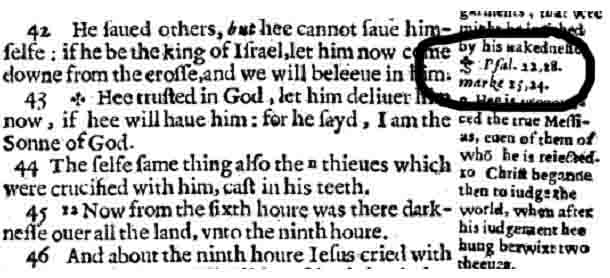 |
The 1560 edition of the Geneva Bible listed two cross-references for Matthew 27:43, namely Psalm 22:9 and Wisdom 2:18. Unlike Psalm 22:9, only Wisdom 2:18 links God's promise to rescue the Just One's claim to be the Son of God. However, the 1599 edition of the same Bible retains only Psalm 22:9 replacing Wisdom 2:18 with a cross reference to the Gospel of Mark.
|
Geneva 1560 - James 3:2 |
Geneva 1599 - Omitted |
|
|
|
The 1560 edition gives James 3:2 three consecutive cross references to the Book of Sirach (Sir. 14:1, 19:16, and 25:11). There is nothing earthshaking regarding these cross references. Still, its interesting that the editors of the 1560 edition saw multiple contacts with Sirach while the editors of the 1599 entirely omits all three.
|
Geneva 1560 - Hebrews 1:3 |
Geneva 1599 - Omitted |
|
|
|
The 1560 edition provides an important cross reference from Hebrews 1:3 to Wisdom 7:26. Hebrews speaks of Jesus as the "refulgence" (Geneva Bible "brightness") of God's glory. The Greek word "Apaugasma" is used only in Hebrews 1:3 and Wisdom 7:26 in the Greek Bible. Moreover, the context of Wisdom's description of Wisdom personified sheds much light (pun intended) on who Jesus is. Unfortunately, the readers of the later 1599 edition were left in the dark as to this connection.
|
Geneva 1560 - Hebrews 11:35 - Omitted |
Geneva 1599 - Reference Added |
|
|
|
The Geneva 1560 edition oddly omits a cross reference to 2 Maccabees 7:1-42 in Hebrews 11:35 even though the connection between these two texts is beyond doubt. Not only is Second Maccabees 7:1-42 the only place in the Greek Bible where people suffered torture and death explicitly for their hope in the resurrection (2 Macc. 7:9, 11, 14, 23, 29), but Hebrews 11:35-36 describes their suffering using the same words as Second Maccabees (tympanizo and empaigmos). The 1599 edition remedied this earlier defect, not by cross referencing 2 Maccabees 7:1-42, but by inserting the cryptic statement, "He [the writer of Hebrews] means that perfection which Antiochus wrought."
In my book, Why Catholic Bibles Are Bigger: The Untold Story of the Lost Books of the Protestant Bible (Grotto Press, 2007), I chronicle the demise of the "Apocrypha" in Protestant Bibles. And frankly it was one of the most difficult sections of my book to write since I could see how so many Protestants today have been unknowingly robbed of their Protestant heritage because later editors were embarrassed by the beliefs of the predecessors. It seemed clear to me then (as it does now) that these omissions were not the result of overcrowded margins. They were removed for another purpose. As the Protestant theologian William Daubney explains,
"Plainly, the references to the Apocrypha told an inconvenient tale of the use which the Church intended should be made of it; so... these references disappeared from the margins" (The Use of the Apocrypha In the Christian Church (London: Clay and Sons, 1900), 21).
Hence we see the Pilgrims' regress from the historic form of the Protestant Bible. Not only that, but even more importantly, we see an even further departure from the form of the historic and ancient Christian Bibles, which always included the Deuterocanon interdispersed within the Old Testament corpus.
